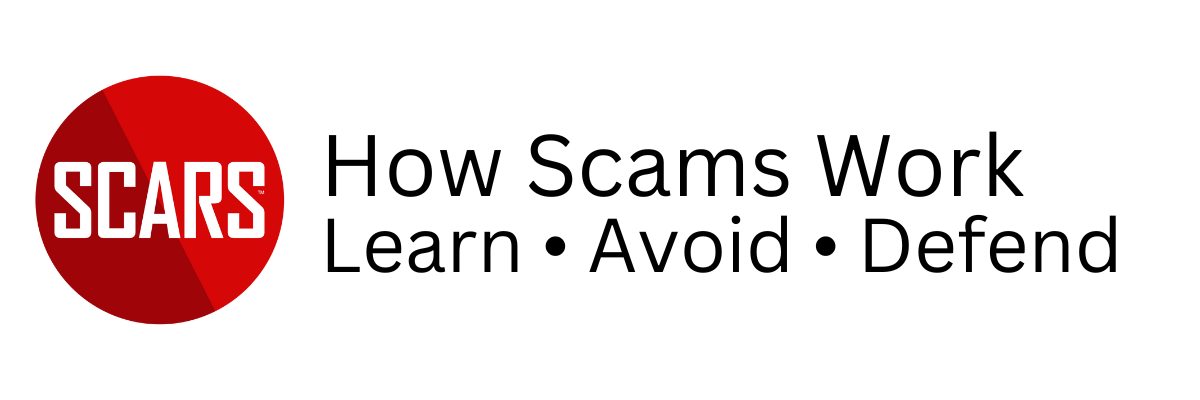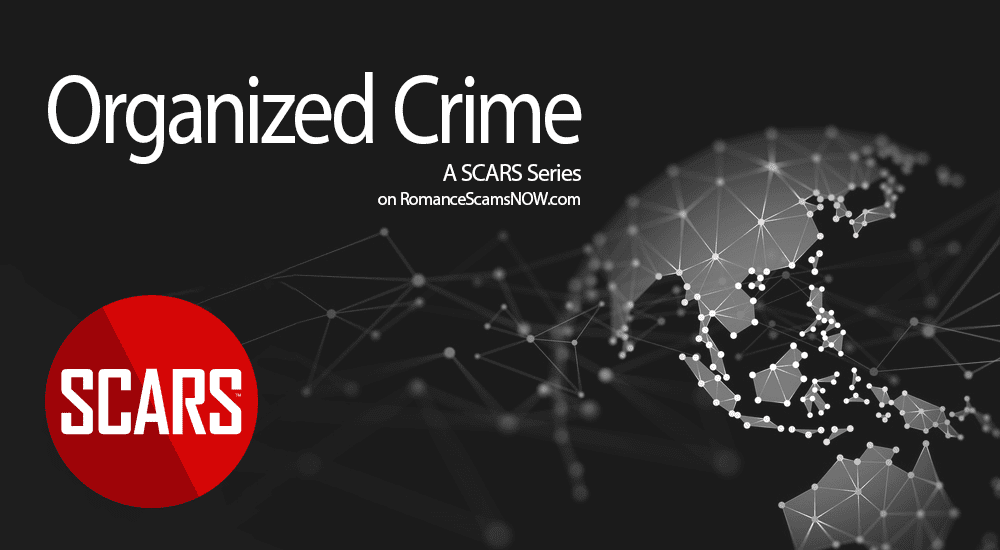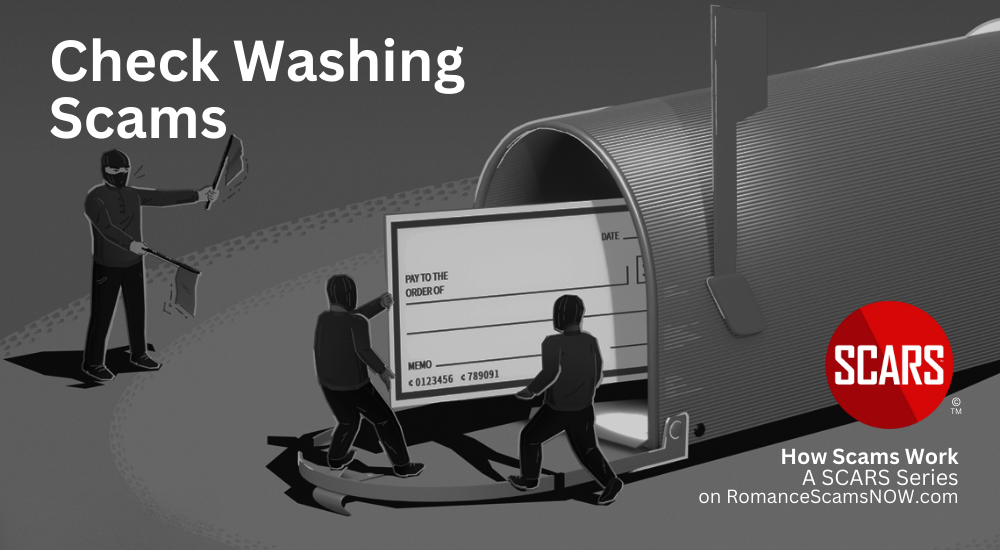
SCARS Institute’s Encyclopedia of Scams™ Published Continuously for 25 Years

Author:
• SCARS Editorial Team – Society of Citizens Against Relationship Scams Inc.
Article Abstract
Protecting yourself from check-washing scams is essential in today’s unsafe world. These scams involve fraudsters stealing checks from the mail, erasing handwritten details like the payee and amount, and rewriting them for their benefit.
Spotting these check washing scams requires careful examination of checks for alterations, tampering, missing information, and security features.
If you suspect a washed check, contact the issuer immediately, report it to law enforcement, and monitor your accounts for unauthorized transactions.
By staying vigilant and implementing security measures, you can protect yourself from the financial consequences of check washing scams.

Protecting Yourself from Check Washing Scams: What You Need to Know
What is a Check Washing Scam?
Check washing is a form of fraud where criminals steal checks from the mail and alter them to their advantage. “Check washing” scams involve fraudsters stealing checks from the mail, erasing the handwritten details (such as the payee and the amount), and then rewriting the check to themselves or to an accomplice for a larger amount.
The process involves using various chemicals and techniques to erase the handwritten details on a legitimate check, such as the payee’s name, the amount, and the signature. Once the original information is removed, the fraudster can fill in new details, such as their own name as the payee and a larger amount than originally written.
This fraudulent alteration often goes unnoticed by the check’s intended recipient until they receive their bank statement or notice discrepancies in their account balance. It’s a type of identity theft and financial fraud that can result in significant financial losses for the victim.
Check Washing Scams: An Old Scam Made New Again
Financial scams come in all shapes and sizes, and one particularly insidious type is the “check washing” scam. While many of us rely on checks for various transactions, from paying bills to receiving payments, criminals see them as an opportunity for fraud. In this article, we’ll explore what check-washing scams are, how to spot them, and what to do if you become a victim.
The Failure of Financial Institutions
Fundamentally, in this digital era, this is a failure of the banks and financial institutions.
Checks are an artifact of a bygone era that now comes with very high risk. But to overcome that risk would actually be very simple: just allow back customers to enter the check numbers and the amount into their mobile or online banking applications for easy comparison. Any bank could do this is short order, but no bank (to our knowledge allows it.)
How to Spot Washed Checks:
The most obvious clue is to: Look for Inconsistent Handwriting. If there is a differences between the amount and the payee’s name or other handwritten details on the check, then investigate a bit more before accepting the check.
- Check for Alterations: Examine the check closely for any signs of alterations, such as variations in ink color, uneven or faded writing, or smudges around the written details.
- Look for Missing Information: Check if any crucial information, such as the payee’s name or the written amount, appears unclear or incomplete. Legitimate checks typically have clear and consistent handwriting throughout.
- Compare with Originals: If you have access to previous checks from the same issuer, compare the handwriting and other details to ensure consistency. Discrepancies may indicate tampering or fraud.
- Use Security Features: Some checks come with security features like watermarks, holograms, or special inks that make alterations more difficult. Check for these features to verify the authenticity of the check.
Dealing with Washed Checks:
If you suspect that a check you’ve received has been washed or altered, it’s crucial to take immediate action to protect yourself from financial losses.
- Contact the Issuer: Inform the issuer of the check, whether it’s a bank, a business, or an individual, about your suspicions. Ask to speak with the fraud department immediately. They can help verify the authenticity of the check and take appropriate measures to prevent further fraud.
- Report to Law Enforcement: File a report with your local law enforcement agency immediately and the postal service inspector’s office if you believe you’ve been a victim of check washing. Providing details about the fraudulent check can help authorities investigate the matter and prevent similar scams in the future.
- Monitor Your Accounts: Keep a close eye on your bank accounts and credit reports for any unauthorized transactions or suspicious activity. Report any discrepancies to your financial institution immediately to prevent further losses. If you think you have a washed or tampered check, ask you bank to change your account number – this will immediately nullify all checks.
- Consider Check Security Measures: Invest in security measures for your checks, such as using check stock with built-in security features, use gel pens that are more resistant to washing, or opting for electronic payments whenever possible to reduce the risk of check fraud.
Summary
Check-washing scams can have serious financial consequences for victims, but by staying vigilant and knowing how to spot fraudulent checks, you can protect yourself from falling prey to these schemes.
Remember to scrutinize any checks you receive for signs of tampering or alterations, and take prompt action if you suspect foul play. By taking proactive measures and staying informed, you can safeguard your finances and avoid becoming another statistic in the world of financial fraud.
More About Check Scams & Banking Scams:
- The Mail Is No Longer Safe In The United States (scamsnow.com)
- Check-Kiting Scheme – Scam Basics (romancescamsnow.com)
- Depositing Fake Checks You Get From A Scammer Can Be A Crime (romancescamsnow.com)
- The Problem With Fake Checks & Job Scams! (romancescamsnow.com)
- Scam Warning: U.S. Stimulus Check Scams (romancescamsnow.com)
- ALERT: Checks From The Government – Scams (romancescamsnow.com)
- Special Report: Fake Checks Scams (romancescamsnow.com)
- SCARS™ Special Report: Fake Check Scams Bait Consumers [PDF REPORT] (romancescamsnow.com)
-/ 30 /-
What do you think about this?
Please share your thoughts in a comment below!
Table of Contents
- Nothing is Safe Anymore, Not Even the Mail!
- Article Abstract
- Protecting Yourself from Check Washing Scams: What You Need to Know
- What is a Check Washing Scam?
- Check Washing Scams: An Old Scam Made New Again
- The Failure of Financial Institutions
- How to Spot Washed Checks:
- Dealing with Washed Checks:
- Summary
- More About Check Scams & Banking Scams:
LEAVE A COMMENT?
Thank you for your comment. You may receive an email to follow up. We never share your data with marketers.
Recent Comments
On Other Articles
- on Love Bombing And How Romance Scam Victims Are Forced To Feel: “I was love bombed to the point that I would do just about anything for the scammer(s). I was told…” Feb 11, 14:24
- on Dani Daniels (Kira Lee Orsag): Another Scammer’s Favorite: “You provide a valuable service! I wish more people knew about it!” Feb 10, 15:05
- on Danielle Delaunay/Danielle Genevieve – Stolen Identity/Stolen Photos – Impersonation Victim UPDATED 2024: “We highly recommend that you simply turn away form the scam and scammers, and focus on the development of a…” Feb 4, 19:47
- on The Art Of Deception: The Fundamental Principals Of Successful Deceptions – 2024: “I experienced many of the deceptive tactics that romance scammers use. I was told various stories of hardship and why…” Feb 4, 15:27
- on Danielle Delaunay/Danielle Genevieve – Stolen Identity/Stolen Photos – Impersonation Victim UPDATED 2024: “Yes, I’m in that exact situation also. “Danielle” has seriously scammed me for 3 years now. “She” (he) doesn’t know…” Feb 4, 14:58
- on An Essay on Justice and Money Recovery – 2026: “you are so right I accidentally clicked on online justice I signed an agreement for 12k upfront but cd only…” Feb 3, 08:16
- on The SCARS Institute Top 50 Celebrity Impersonation Scams – 2025: “Quora has had visits from scammers pretending to be Keanu Reeves and Paul McCartney in 2025 and 2026.” Jan 27, 17:45
- on Scam Victims Should Limit Their Exposure To Scam News & Scammer Photos: “I used to look at scammers photos all the time; however, I don’t feel the need to do it anymore.…” Jan 26, 23:19
- on After A Scam, No One Can Tell You How You Will React: “This article was very informative, my scams happened 5 years ago; however, l do remember several of those emotions and/or…” Jan 23, 17:17
- on Situational Awareness and How Trauma Makes Scam Victims Less Safe – 2024: “I need to be more observant and I am practicing situational awareness. I’m saving this article to remind me of…” Jan 21, 22:55
ARTICLE META
Important Information for New Scam Victims
- Please visit www.ScamVictimsSupport.org – a SCARS Website for New Scam Victims & Sextortion Victims
- Enroll in FREE SCARS Scam Survivor’s School now at www.SCARSeducation.org
- Please visit www.ScamPsychology.org – to more fully understand the psychological concepts involved in scams and scam victim recovery
If you are looking for local trauma counselors please visit counseling.AgainstScams.org or join SCARS for our counseling/therapy benefit: membership.AgainstScams.org
If you need to speak with someone now, you can dial 988 or find phone numbers for crisis hotlines all around the world here: www.opencounseling.com/suicide-hotlines
A Note About Labeling!
We often use the term ‘scam victim’ in our articles, but this is a convenience to help those searching for information in search engines like Google. It is just a convenience and has no deeper meaning. If you have come through such an experience, YOU are a Survivor! It was not your fault. You are not alone! Axios!
A Question of Trust
At the SCARS Institute, we invite you to do your own research on the topics we speak about and publish, Our team investigates the subject being discussed, especially when it comes to understanding the scam victims-survivors experience. You can do Google searches but in many cases, you will have to wade through scientific papers and studies. However, remember that biases and perspectives matter and influence the outcome. Regardless, we encourage you to explore these topics as thoroughly as you can for your own awareness.
Statement About Victim Blaming
SCARS Institute articles examine different aspects of the scam victim experience, as well as those who may have been secondary victims. This work focuses on understanding victimization through the science of victimology, including common psychological and behavioral responses. The purpose is to help victims and survivors understand why these crimes occurred, reduce shame and self-blame, strengthen recovery programs and victim opportunities, and lower the risk of future victimization.
At times, these discussions may sound uncomfortable, overwhelming, or may be mistaken for blame. They are not. Scam victims are never blamed. Our goal is to explain the mechanisms of deception and the human responses that scammers exploit, and the processes that occur after the scam ends, so victims can better understand what happened to them and why it felt convincing at the time, and what the path looks like going forward.
Articles that address the psychology, neurology, physiology, and other characteristics of scams and the victim experience recognize that all people share cognitive and emotional traits that can be manipulated under the right conditions. These characteristics are not flaws. They are normal human functions that criminals deliberately exploit. Victims typically have little awareness of these mechanisms while a scam is unfolding and a very limited ability to control them. Awareness often comes only after the harm has occurred.
By explaining these processes, these articles help victims make sense of their experiences, understand common post-scam reactions, and identify ways to protect themselves moving forward. This knowledge supports recovery by replacing confusion and self-blame with clarity, context, and self-compassion.
Additional educational material on these topics is available at ScamPsychology.org – ScamsNOW.com and other SCARS Institute websites.
Psychology Disclaimer:
All articles about psychology and the human brain on this website are for information & education only
The information provided in this article is intended for educational and self-help purposes only and should not be construed as a substitute for professional therapy or counseling.
While any self-help techniques outlined herein may be beneficial for scam victims seeking to recover from their experience and move towards recovery, it is important to consult with a qualified mental health professional before initiating any course of action. Each individual’s experience and needs are unique, and what works for one person may not be suitable for another.
Additionally, any approach may not be appropriate for individuals with certain pre-existing mental health conditions or trauma histories. It is advisable to seek guidance from a licensed therapist or counselor who can provide personalized support, guidance, and treatment tailored to your specific needs.
If you are experiencing significant distress or emotional difficulties related to a scam or other traumatic event, please consult your doctor or mental health provider for appropriate care and support.
Also read our SCARS Institute Statement about Professional Care for Scam Victims – click here to go to our ScamsNOW.com website.
















Unbelievable ♀️